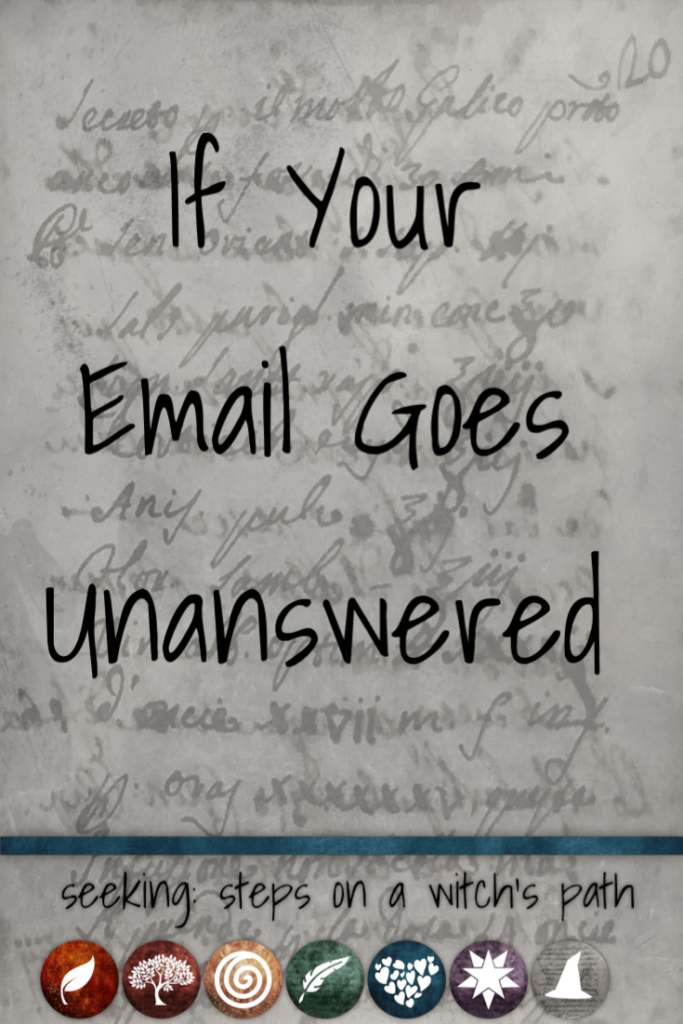One complaint I’d heard from people a lot is that they email a group or teacher or someone else Pagan and never get a response. There are many reasons an email might go unanswered. Here’s a list of some of the more common reasons, and some ways you can possibly solve them.

They never got your email:
Email does go missing in the ether and can get eaten by a spam filter without anyone realising it.
If you don’t hear back in 2-4 weeks, it’s fine to try again. Just review the rest of these points first, and make sure you’re writing the clearest email possible. Choose a clear subject line that doesn’t look like spam. (You might review the points about writing a great intro email too.)
Your email is completely incoherent.
I hope that everyone reading this will avoid this one, but it’s surprisingly common.
Some people send off an email with so many misspellings, missing words, and other problems that it’s impossible to figure out what’s going on without taking a great deal of time and energy. Not a high priority for people with a lot else on their plate.
The email is very vague.
Some people send a very general email “I want to learn about Wicca: tell me everything.”
Some people have a generic answer they cut and paste to this kind of email – a list of good resources, places to start, discussion forums with lots of people who might have a spare moment to answer. (This website is my partial answer to this.) But if someone doesn’t have that set up, they might not answer.
The email indicates that there are some significant mental health, safety, or other wellbeing concerns.
While offering some guidance would be nice, there’s a limited amount that can be done through email, and someone may not feel able offer a meaningful answer to a complete stranger. They may also have concerns about persistent or even abusive demands for help if they answer.
(My High Priestess once, during my training, had someone call her over 20 times in a 24 hour period that got increasingly upsetting and even threatening. Fortunately, the person in question was married, and my HPS could talk to his wife about seeking appropriate health evaluation and support. Over email, that’s a lot harder to arrange.)
The email is asking about something the reader can’t offer.
For example, someone might ask about training in a totally different area of the country. Again, many people now have a simple reply they can paste in with information on how to find groups in someone’s area, but if they don’t, finding that can take quite some time.
The person is not online much:
It can be easy to forget, but there are lots of people out there who do not live online. Many spend only a few minutes on email most days, or focus on communication with close friends and family, and spend most of their time doing other things. Some people may not have email at home, or might have computer problems, or just be out doing other things.
Whatever the reason, it often means that someone may not answer vague or general emails – and just focus on the very specific ones related to their group.
Some group leaders only answer group-related emails at specific points.
Some do it once a week or once a month (unless a crisis or special event comes up, when it might be longer). Some only answer emails about the group when their next training opening comes along.
The group I trained with used to save up emails until the next set of introductory classes was scheduled (which might be 3-4 months after the email).
The person/group is so chaotic and disorganised that they can’t keep up with general inquiries
Again, sometimes this is for a decent reason (major crisis in the family, like a serious illness or accident). But sometimes, groups just aren’t on top of basic things like getting back in email.
In these cases, I generally advise trying again in a month or two, and if nothing comes of it, moving on to exploring other options. You can circle back and try again at a later point, when maybe things will have changed for the group.

Written December 25, 2016. Reformatted November 2020.



